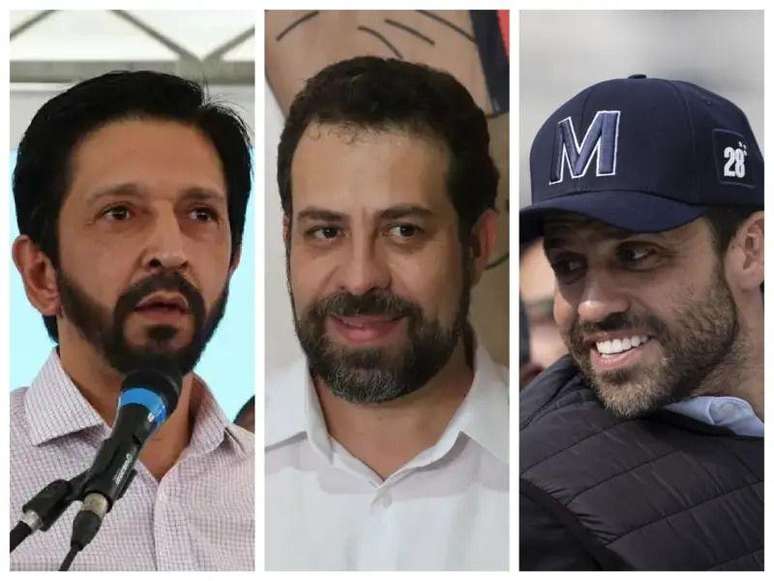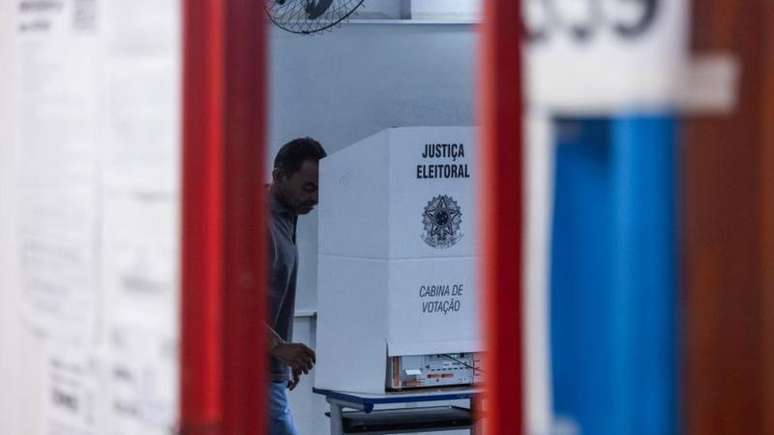Look at some more unpredictable and capital disputes whose outcome can reverberate beyond municipal boundaries.
Around 34 million Brazilians will be able to vote this Sunday in 5,570 municipalities (6/10).
Election polls indicate that in many places the mayoral position will be filled in the first round, but there are still large cities and capitals where the race for the second round is fierce.
See below for some more unpredictable and capital disputes whose outcome could reverberate beyond municipal boundaries.
1. Sao Paulo (SP)
Sao Paulo (SP), Brazil’s largest constituency with 9.3 million voters, went into election day with no clarity on which of the three most voted candidates would go to the second round.
Candidates Guilherme Boulos (PSOL), Ricardo Nunes (MDB) and Pablo Marçal (PRTB) were in a technical tie, with 29%, 26% and 26% voting intentions respectively, according to the latest Datafolha poll, published on Saturday ( 5/10).
However, the Atlas poll released on Saturday also shows a slightly more defined scenario, with Boulos with 29.9% of voting intentions followed by Marçal, with 27.8% and Nunes with 18.6%.
The dispute has become more unpredictable after the rise of the radical right candidate Pablo Marçal, who had one of the most discussed moments of the electoral period when he took over the presidency from another candidate, José Luiz Datena (PSDB), after having provoked him during a debate. The episode had repercussions in the foreign press.
Marçal rose to the right without the support of former president Jair Bolsonaro (PL). Bolsonaro’s candidate would be Ricardo Nunes, but his campaign did not make much use of the former president, who did not even hold a rally in Sao Paulo.
“If Marçal passes to the second round, it means a rebellion in the right-wing camp, which since 2018 has been monopolized by Bolsonaro, that is, all cadres have always depended on his blessings,” says political scientist Antônio Lavareda.
“Marçal doesn’t even need to win, just get to the second round. This breaks with the Bolsonarist hegemony of the right and is an invitation to other rebellions,” says Lavareda.

2. Belo Horizonte (MG)
The dispute is also very heated in Belo Horizonte (MG), where two right-wing candidates and one centre-right are the favorites for the second round.
According to the latest Datafolha poll, Saturday (5/10), the candidate Bruno Engler (PL) is technically tied with 26%, the current mayor Fuad Noman (PSD) with 25% and the deputy Mauro Tramonte ( Republicans) with 23%.
One of the ten largest constituencies in the country, with 1.9 million voters, the city is expected to be an excellent electoral platform for presidential candidates in 2026.
3. Fortaleza (CE)
Fortaleza is one of the cities with the most bitter controversies, with four candidates – two from the right and two from the left – fighting to advance to the second round.
In the lead are Evandro Leitão (PT) and André Fernandes (PL), in technical parity with 26% and 25% of voting intentions respectively, according to the Real Time Big Data survey published on Wednesday (2/10).
But with a margin of error of 3 percentage points, candidates Captain Wagner (União Brasil) and José Sarto (PDT) are not out of the running, with 19% and 16% of voting intentions respectively.
4. Manaus (AM)
Manaus is also one of the cities with an undefined second round dispute.
Although the current mayor David Almeida (Avante) is in the lead, with 29% of voting intentions, according to the AtlasIntel poll released on Thursday (3/10), second place is still uncertain, with Captain Alberto Neto (PL ) and Amom Mandel (Citizenship) ) in the running. They have 22% and 20% of voting intentions respectively.
5. Rio de Janeiro (RJ)
In Rio de Janeiro, the current mayor Eduardo Paes (PSD) leads the race with 61% of voting intentions, according to a Datafolha poll published on Saturday (5/10).
Bolsonarism’s main bet in these elections, Alexandre Ramagem (PL), was unsuccessful in the polls, although the distance between him and Paes decreased over the course of the campaign.
Last week, the PL candidate had a busy schedule of events with former president Jair Bolsonaro, who has taken a bigger role as an activist in this election than when he was president.
However, for political scientist Antônio Lavareda, Ramagem’s performance in the polls is not a sign of a slowdown in Bolsonarism.
“Elections normally revolve around the incumbent mayor – mayors with good ratings rarely lose elections,” he says.
“The Rio elections are a sign of the good evaluation of Paes rather than of a weakness of Bolsonarism.”

6. Recife (PE)
In Recife the polls show the victory of the current mayor João Campos (PSB), the popular son of Eduardo Campos and heir to his political capital.
With a government considered excellent or good by 76% of Recife residents, according to the Datafolha institute, João Campos has around 80% of voting intentions and, therefore, should win in the first round. The numbers come from the Datafolha survey published on Saturday (5/10).
Its percentage of voting intentions in polls is the second highest among capital cities, and is second only to Doutor Furlan (MDB) of Macapá (AP).
With his likely success this Sunday (6/10), Campos is ready to run for governor in 2026, according to political scientist Túlio Velho Barreto, of Fundaj (Fundação Joaquim Nabuco).
He is also establishing himself as one of the leaders who can renew the left in the country, says Lavareda.
“His electoral success combined with his social media success will nationalize João Campos once and for all, consolidate him as one of the new leaders of the left.”
7. Macapá (AP)
With the highest rate of voting intention among the country’s capitals, the current mayor of Macapá, Dr. Furlan (MDB), is running for re-election with a great advantage over the other candidates, so much so that he has not even attended the debates.
According to the Gerp poll released on Tuesday (1/10), he had 81% of voting intentions and should win in the first round.
8. Porto Alegre (RS)
In Porto Alegre, on Monday (30/9), Mayor Sebastião Melo (MDB) had 32% of voting intentions – a likely result of the assessment of the municipality’s response to the flooding that hit the city in March this year , says Lavareda.
Meanwhile, the left vote is split between the PT candidate, Maria do Rosário, and Juliana Brizola (PDT), who have 29% and 23% of voting intentions respectively.
*with reporting by Letícia Mori and Vitor Tavares
Source: Terra
Rose James is a Gossipify movie and series reviewer known for her in-depth analysis and unique perspective on the latest releases. With a background in film studies, she provides engaging and informative reviews, and keeps readers up to date with industry trends and emerging talents.






